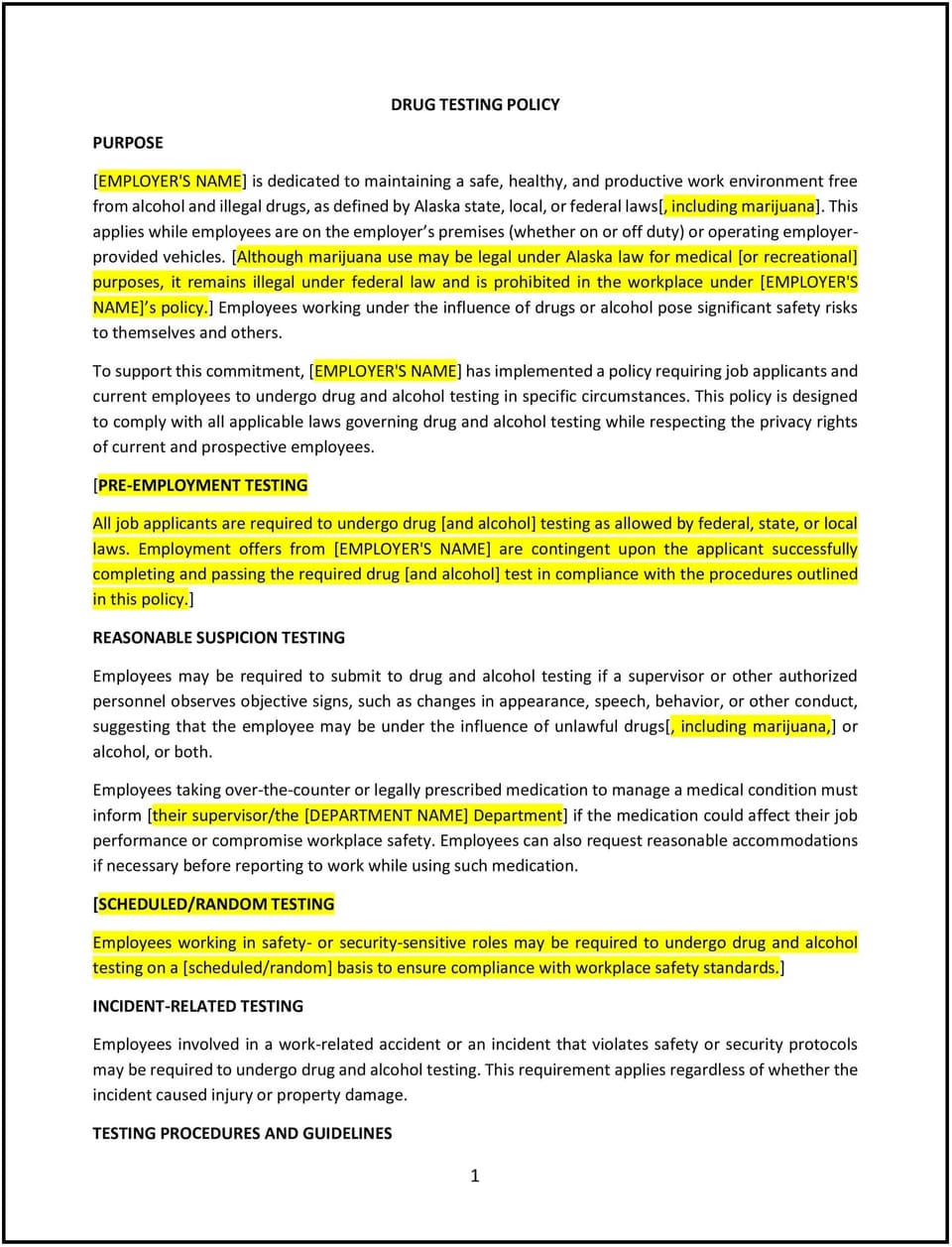Drug testing policy (Alaska): Free template

Drug testing policy (Alaska)
In Alaska, a drug testing policy establishes clear guidelines for maintaining a safe, productive, and drug-free workplace. This policy outlines the procedures for conducting drug tests, the circumstances under which testing may occur, and the consequences for policy violations. By implementing a drug testing policy, businesses can reduce safety risks, comply with legal and industry standards, and promote employee well-being.
Alaska’s unique industries, such as oil, gas, and fishing, often involve hazardous environments where safety is critical. Businesses operating in these sectors may tailor their policies to address specific risks and regulatory requirements.
How to use this drug testing policy (Alaska)
- Define testing scenarios: Specify the circumstances under which drug testing will occur, such as pre-employment screening, random testing, post-accident testing, or reasonable suspicion.
- Outline testing procedures: Clearly explain how drug tests will be conducted, including the types of tests used, sample collection processes, and confidentiality measures.
- Address legal compliance: Ensure the policy adheres to Alaska-specific and federal laws, particularly for industries with mandatory testing requirements.
- Communicate consequences: Include the potential outcomes of policy violations, such as mandatory counseling, suspension, or termination.
- Educate employees: Share the policy during onboarding and provide ongoing training to ensure employees understand their rights, responsibilities, and the company’s commitment to safety.
Benefits of using a drug testing policy (Alaska)
A drug testing policy provides significant advantages for businesses in Alaska. Here’s how it helps:
- Enhances safety: Reduces workplace accidents and injuries by ensuring employees are not under the influence of drugs during critical tasks.
- Supports compliance: Helps businesses meet regulatory requirements for drug testing, particularly in safety-sensitive industries.
- Protects reputation: Demonstrates the company’s commitment to maintaining a safe and responsible workplace, building trust with clients and stakeholders.
- Encourages accountability: Provides clear consequences for policy violations, promoting a culture of responsibility and professionalism.
- Reduces liability risks: Mitigates the potential for legal claims or disputes related to workplace accidents involving substance use.
Tips for using a drug testing policy (Alaska)
- Tailor to your industry: Address specific requirements for safety-sensitive roles, such as operating heavy machinery or working in hazardous conditions.
- Ensure confidentiality: Clearly outline how test results will be handled to protect employee privacy and comply with applicable laws.
- Use reputable testing providers: Partner with accredited drug testing facilities to ensure accurate and reliable results.
- Provide support options: Include resources for employees struggling with substance use, such as access to counseling or employee assistance programs (EAPs).
- Regularly review the policy: Update the policy to reflect changes in state or federal laws, industry standards, or workplace needs.
Q: What types of drug tests are typically included in this policy?
A: Common tests include urine, saliva, blood, or hair follicle tests, depending on the role and industry-specific requirements.
Q: When should drug testing be conducted?
A: Testing may occur during pre-employment screening, randomly, after workplace accidents, or if there is reasonable suspicion of substance use.
Q: How does the policy address employee privacy?
A: The policy ensures confidentiality by restricting access to test results to authorized personnel and complying with applicable privacy laws.
Q: What are the consequences of a failed drug test?
A: Consequences may include mandatory counseling, suspension, or termination, depending on the severity of the violation and the company’s policies.
Q: How often should this policy be reviewed?
A: The policy should be reviewed annually or whenever significant changes occur in laws, industry standards, or workplace practices.
This article contains general legal information and does not contain legal advice. Cobrief is not a law firm or a substitute for an attorney or law firm. The law is complex and changes often. For legal advice, please ask a lawyer.


